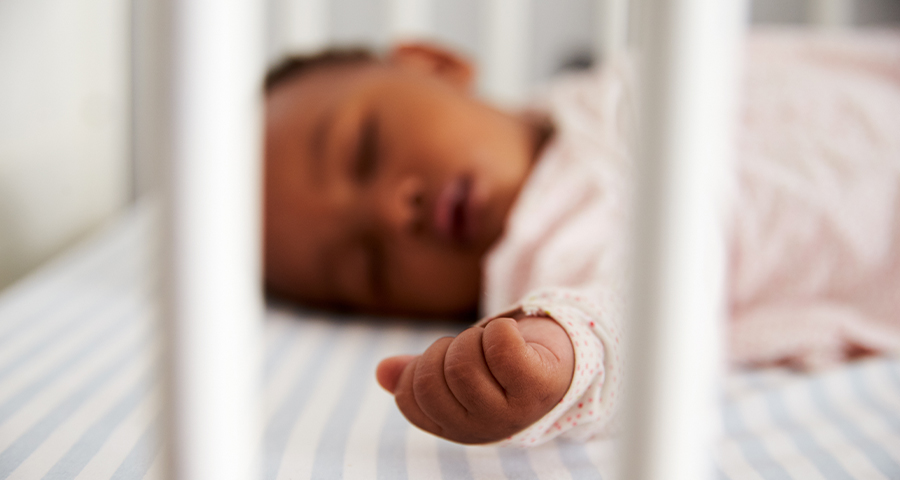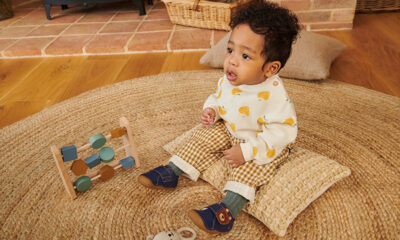Advice
Expert Insights From The Lullaby Trust


Expert / 6 January, 2025 / Christina Walter
When it comes to baby sleep, there’s no shortage of advice, but how much of it is actually true? With so many myths floating around, it can be hard for new parents to know what to believe. In this article, we’re partnering with The Lullaby Trust to separate fact from fiction and provide expert advice on creating safe, peaceful sleep routines for your little one. Let’s dive in and debunk some common baby sleep myths!
Baby Sleep Myths:
Babies could choke on their vomit if they sleep on their backs
Putting your baby on their back to sleep doesn’t put them at greater risk of choking on their own vomit. Evidence has shown that sleeping your baby on their back is the safest position for a baby to sleep and reduces the risk of sudden infant death syndrome (SIDS). Since The Lullaby Trust’s ‘Back to Sleep’ campaign in the 90s, over 30,000 babies’ lives have been saved.
Your baby should be sleeping for 12 hours each night by six months old
Baby sleep patterns vary greatly. Some, especially newborn babies, may sleep for 20 hours during a 24-hour period, and others for 10 hours. Try not to compare your baby to others, as it can be unhelpful as sleep patterns don’t become similar between babies until at least the end of the first year. Factors like teething or hunger as they grow can also mean they wake more frequently.
Babies need a pillow to prevent flat head syndrome (plagiocephaly)
Pillows increase the risk of SIDS by up to 2.5 times. It is much safer to sleep your baby in a clear, flat, firm, separate sleep space.
If you are worried about flat head syndrome, babies should have plenty of supervised tummy time during their waking hours to minimise the time spent on their back. Avoid letting your baby sleep in harder, contained sleep environments, such as car seats. Flathead syndrome typically corrects itself within a year, but if you’re worried, speak to your health professional.
Buying certain products can help your baby sleep longer
For tired parents, any product claiming to help your baby sleep for longer might sound like a good idea. But it is typical for babies under one (and sometimes older) to wake during the night, particularly if they are breastfed. Encouraging babies to sleep for longer and more deeply than normal for their stage of development is not advised. It could affect their ability to wake up if something is wrong, such as their mouth and nose becoming covered. This inability to wake easily from sleep is thought to be linked to SIDS.
Babies get better sleep in a separate room
Research has shown that the risk of SIDS is reduced if your baby sleeps in the same room as you for the first six months, day and night. There are also further benefits to you and your baby. Babies rely on the comfort of being close to their parents or carers and need this during the night as well as during the day. Sharing a room with a baby enables parents and carers to respond early to cues such as murmuring or restlessness in the baby, without them starting to cry or becoming distressed.
Babies sleep better with weighted blankets/bedding
The Lullaby Trust advises you avoid using weighted swaddles, blankets or sleeping bags. The safest place for them to sleep is their own clear, flat, firm, separate sleep space. Weighted sleep products can put babies at greater risk of overheating, which increases the risk of SIDS. It can also put pressure on their chest, not allowing them to expand their chest fully for breathing.
Safer Sleep Week 2025, 10th – 16th March
One of our key campaigns of the year is Safer Sleep Week. We know that greater awareness of safer sleep leads to a decrease in the number of babies dying from SIDS, and gives families a safer start to life. With life-saving messages and safer sleep advice, we will empower families and professionals with trusted advice.
For Safer Sleep Week 2025, we’ll be:
- Exploring baby sleep cycles. How long should your baby be sleeping for at their age? When should you seek professional advice?
- Busting baby sleep myths. Which myths and products are backed by evidence, and which aren’t, or could even be dangerous for your baby.
- Supporting parents and carers through their own lack of sleep. We’ll help you with sleep deprivation, and make it easier for you to follow safer sleep with your baby, even when exhausted.
About us: The Lullaby Trust is a charity that exists to keep babies safe and keep grieving families supported. We do this by:
- Empowering parents, carers and professionals with trusted advice on baby safety including safer sleep and infection prevention.
- Funding research into sudden and unexpected death of babies and young children, to save lives.
- Offering anyone affected by the sudden or unexpected death of a baby or young child a supportive space to grieve, with bereavement support.
Our Impact
The work we have done over the decades has reduced the rates of sudden infant death syndrome (SIDS) by 81% since 1991. We’ve invested over £12 million into research over the years, which paired with nation-conquering safer sleep guidance and awareness, has saved over 30,000 babies’ lives (since 1991). We will not rest until no baby dies suddenly or unexpectedly.
Content in collaboration with The Lullaby Trust.
Read Next
Best Skincare Products For Babies & Toddlers
Essential Weaning Food Storage Containers for Your Little One
-

 Destination7 months ago
Destination7 months agoSingapore Airlines CEO set to join board of Air India, BA News, BA
-

 Breaking News8 months ago
Breaking News8 months agoCroatia to reintroduce compulsory military draft as regional tensions soar
-

 Tech News11 months ago
Tech News11 months agoBangladeshi police agents accused of selling citizens’ personal information on Telegram
-

 Breaking News8 months ago
Breaking News8 months agoBangladesh crisis: Refaat Ahmed sworn in as Bangladesh’s new chief justice
-

 Guides & Tips9 months ago
Guides & Tips9 months agoHave Unlimited Korean Food at MANY Unlimited Topokki!
-

 Gaming8 months ago
Gaming8 months agoThe Criterion Collection announces November 2024 releases, Seven Samurai 4K and more
-

 Toys10 months ago
Toys10 months ago15 of the Best Trike & Tricycles Mums Recommend
-

 Tech News9 months ago
Tech News9 months agoSoccer team’s drone at center of Paris Olympics spying scandal























